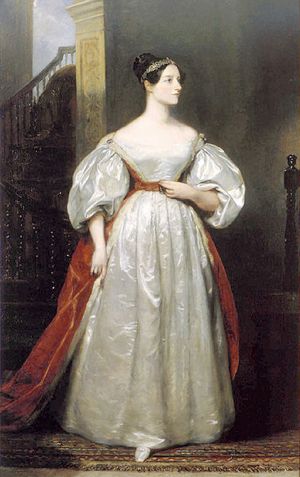A magazine where the digital world meets the real world.
On the web
- Home
- Browse by date
- Browse by topic
- Enter the maze
- Follow our blog
- Follow us on Twitter
- Resources for teachers
- Subscribe
In print
What is cs4fn?
- About us
- Contact us
- Partners
- Privacy and cookies
- Copyright and contributions
- Links to other fun sites
- Complete our questionnaire, give us feedback
Search:
The pen, the paper and the poet's daughter

In the 1800s 'computers' were teams of people employed to calculate tables of numbers used, for example, when navigating. Charles Babbage changed that when he invented the first general purpose programmable computer. He called it the 'Analytical Engine' and it was intended to eradicate human error from the tables by taking over the whole job. Babbage is famous as the grandfather of computing as a result, though few people know of the other person who was vital to the success of the Analytical Engine.
The key thing to notice is that the Analytical Engine was the first programmable computer. Babbage's main concern was in creating the hardware but of course in doing so he also created a completely new job -that of computer programmer. Without programs for it to run, his machine was useless.
So Babbage's computers needed programs and for that he needed a woman called Ada Lovelace. She was the daughter of the poet Lord Byron and an accomplished mathematician, having been kept well away from her father, who was seen as a corrupting influence!
Unfortunately Babbage struggled to get funding for his ideas, not least because of his confrontational personality, and he never built the Analytical Engine. While waiting for the machine to be built, Ada kept herself busy. Even though the Analytical Engine didn't exist, she wrote programs for it based on Babbage's plans, and even tested them on paper even though she couldn't run them on the machine. The same technique is still used today by programmers to help get rid of bugs in their code at an early stage.
Some credit Ada with writing the very first program, though it is not entirely clear whether Ada or Charles actually did that. The earliest written record of programming, though, is of Ada correcting a faulty program written by Babbage.
Ada may be less well known than Charles but at least she actually finished her part of the work - unlike him.


